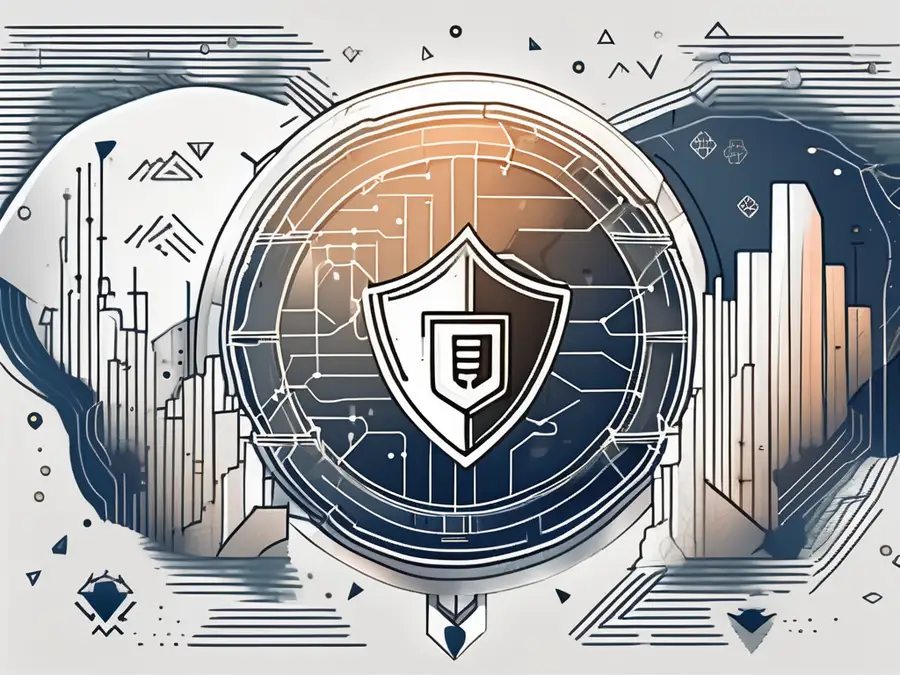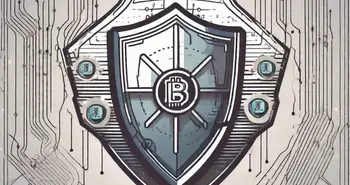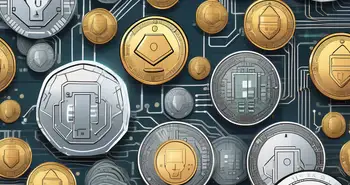An Updated Guide to Crypto Security

Cryptocurrency has definitely made its mark on the financial world, revolutionizing the way we think about money and transactions. But with great power comes great responsibility. And in the world of crypto, that responsibility falls on our shoulders when it comes to ensuring the security of our digital assets. In this ultimate guide, I will walk you through the ins and outs of crypto security, empowering you to protect your investments and stay one step ahead of the scammers.
Understanding Cryptocurrency
Before we dive into the depths of crypto security, let's first establish a solid understanding of what cryptocurrency actually is. Put simply, cryptocurrency is a form of digital or virtual currency that utilizes cryptography for secure financial transactions, control the creation of additional units, and verify the transfer of assets. It is decentralized and operates on a technology called blockchain. But why is this important in the context of security, you might ask?
The very nature of cryptocurrency being decentralized and operating on a blockchain means that it is not governed by any central authority. This lack of centralization eliminates the need for intermediaries and opens up a whole new world of financial possibilities. However, it also means that the responsibility of securing your crypto assets lies solely with you. No bank or institution will come to your rescue if you fall victim to a hack or scam.
What is Cryptocurrency?
Cryptocurrency is essentially a digital or virtual form of currency that utilizes cryptography for secure financial transactions. It operates on a technology called blockchain, which is a decentralized and distributed ledger that records all transactions across a network of computers. This means that transactions are secure and transparent, as they cannot be altered or tampered with once they are recorded on the blockchain.
Popular cryptocurrencies like Bitcoin, Ethereum, and Litecoin have gained significant traction in recent years, with many individuals and businesses embracing them as viable forms of payment.
The Evolution of Cryptocurrency
Cryptocurrency has come a long way since its inception. It all started with the creation of Bitcoin by an anonymous individual or group known as Satoshi Nakamoto in 2009. Bitcoin was the first decentralized cryptocurrency, and it paved the way for the development of numerous other cryptocurrencies in the years that followed.
Today, cryptocurrencies have become a global phenomenon, with millions of people around the world investing in them and using them for various purposes, such as online purchases and cross-border transactions. The rapid evolution of cryptocurrency has brought about significant advancements in security measures, as the community continues to learn from past mistakes and adapt to new challenges.
The Importance of Crypto Security
Now that we have a solid understanding of cryptocurrency, let's dive into the importance of crypto security. The world of crypto is riddled with risks and threats, and neglecting to prioritize your security can have devastating consequences. Let's explore some of the risks involved in crypto trading and the impact of crypto hacks.
Risks Involved in Crypto Trading
Crypto trading can be highly volatile and unpredictable. The value of cryptocurrencies can fluctuate dramatically within short periods, which can lead to significant gains or losses. Additionally, the decentralized nature of the crypto market makes it a target for manipulation and fraudulent activities. Scammers are always on the lookout for vulnerable traders who can fall prey to their schemes.
As a crypto trader, it is crucial to familiarize yourself with the risks involved and take precautionary measures to safeguard your investments. This includes implementing robust security practices and staying informed about the latest trends and developments in the crypto world.
The Impact of Crypto Hacks
The impact of crypto hacks cannot be underestimated. Over the years, we have witnessed numerous high-profile hacks that have resulted in millions of dollars worth of cryptocurrencies being stolen. These hacks not only affect individuals but also shake the foundation of trust in the entire crypto ecosystem.
While developers and security experts continuously work towards strengthening the security of cryptocurrencies, it is ultimately up to the individual user to ensure the safety of their assets. By taking proactive steps to enhance your crypto security, you significantly reduce the risk of falling victim to these malicious attacks.
Basic Principles of Crypto Security
Now that we understand the importance of crypto security, let's explore some basic principles that should serve as the foundation of your security practices.
Private and Public Keys
At the core of crypto security are private and public keys. A private key is a secret code that grants you access to your crypto assets. It should be kept confidential and protected at all costs. On the other hand, a public key is a publicly visible code that allows others to send you cryptocurrencies. When making transactions, your private key is used to create a digital signature that verifies the authenticity of the transaction. Always remember to keep your private keys offline and store them in secure hardware wallets for maximum protection.
Secure Wallets and Their Importance
Your crypto assets are only as secure as the wallet you use to store them. Secure wallets provide a safe and convenient way to manage and store your cryptocurrencies. There are various types of wallets available, including hardware wallets, software wallets, and online wallets. Hardware wallets, such as Trezor and Ledger, are considered the most secure option as they store your private keys offline, away from potential online threats. Whichever wallet you choose, make sure it has robust security features and regularly update its software to stay protected against emerging threats.
Advanced Crypto Security Measures
If you want to take your crypto security to the next level, consider implementing advanced security measures.
Two-Factor Authentication
Two-factor authentication (2FA) adds an extra layer of security to your crypto accounts. This involves using a second device or application to verify your identity when logging in or making transactions. By enabling 2FA, even if someone manages to obtain your login details, they would still need access to your second authorized device to gain control of your account. This significantly reduces the risk of unauthorized access and provides an additional barrier against hackers.
Using Hardware Wallets for Extra Security
Hardware wallets are widely regarded as the most secure way to store your cryptocurrency. They are physical devices that store your private keys offline, making them impervious to online threats. By using a hardware wallet, you can eliminate the risk of your private keys being compromised by hackers or malware. While hardware wallets may come with a small upfront cost, the peace of mind they provide is invaluable.
Best Practices for Crypto Security
To wrap up this ultimate guide to crypto security, let's explore some best practices that every crypto investor should follow.
Regularly Updating Security Measures
Crypto security is an ongoing process that requires constant vigilance. It is essential to stay up to date with the latest security practices and technologies. Regularly update your software wallets, hardware wallets, and any other tools or platforms you use for crypto transactions. By doing so, you can ensure that you are protected against the latest threats and vulnerabilities.
Avoiding Common Crypto Scams
The world of crypto is fertile ground for scammers and fraudsters. They are always devising new schemes and tactics to trick unsuspecting individuals out of their hard-earned money. Stay informed about common crypto scams, such as phishing attempts, fake investment opportunities, and Ponzi schemes. Always verify the authenticity of the platform or service before disclosing any personal information or investing your funds.
FAQ
What is cryptocurrency?
Cryptocurrency is a form of digital or virtual currency that utilizes cryptography for secure financial transactions. It is decentralized and operates on a technology called blockchain.
Why is crypto security important?
Crypto security is important because the responsibility of securing your crypto assets lies solely with you. Neglecting to prioritize your security can have devastating consequences, such as falling victim to hacks or scams.
What are private and public keys?
Private keys are secret codes that grant you access to your crypto assets, while public keys are publicly visible codes that allow others to send you cryptocurrencies.
What are hardware wallets?
Hardware wallets are physical devices that store your private keys offline, away from potential online threats. They are widely regarded as the most secure way to store your cryptocurrency.
How can I enhance my crypto security?
To enhance your crypto security, you can implement measures such as two-factor authentication, using hardware wallets, regularly updating security measures, and staying informed about common crypto scams.
As an expert in crypto security, I'd like to share a personal story:
Early in my crypto journey, I fell victim to a phishing scam that almost wiped out my entire investment. I received an email that appeared to be from a popular crypto exchange, asking me to verify my account details due to a security breach. Without thinking twice, I clicked on the link provided and entered my login credentials. Little did I know, I had just handed over my private keys to a malicious scammer.
This incident taught me a valuable lesson about the importance of staying vigilant and verifying the authenticity of any communication or platform. Since then, I have implemented robust security measures, such as two-factor authentication and hardware wallets, to ensure the safety of my crypto assets.
Conclusion
As the world of cryptocurrency continues to evolve, it is paramount that we prioritize our security and take responsibility for safeguarding our digital assets. By following the principles and best practices outlined in this guide, you can significantly reduce the risk of falling victim to hacks and scams. Remember, crypto security is not a one-time endeavor but rather an ongoing commitment to stay informed, adapt to new challenges, and protect what's rightfully yours.
Now that you're equipped with the knowledge to secure your digital assets, why not take your trading to the next level with Morpher? As a platform at the forefront of blockchain-powered trading, Morpher.com offers you a seamless experience with zero fees, infinite liquidity, and the flexibility of fractional investing. Embrace the future of investing with the safety and control of a non-custodial wallet, the potential of 10X leverage, and the innovation of Virtual Futures trading. Ready to transform your trading journey? Sign Up and Get Your Free Sign Up Bonus today, and join the Morpher community of savvy investors!

Disclaimer: All investments involve risk, and the past performance of a security, industry, sector, market, financial product, trading strategy, or individual’s trading does not guarantee future results or returns. Investors are fully responsible for any investment decisions they make. Such decisions should be based solely on an evaluation of their financial circumstances, investment objectives, risk tolerance, and liquidity needs. This post does not constitute investment advice.

Painless trading for everyone
Hundreds of markets all in one place - Apple, Bitcoin, Gold, Watches, NFTs, Sneakers and so much more.

Painless trading for everyone
Hundreds of markets all in one place - Apple, Bitcoin, Gold, Watches, NFTs, Sneakers and so much more.









